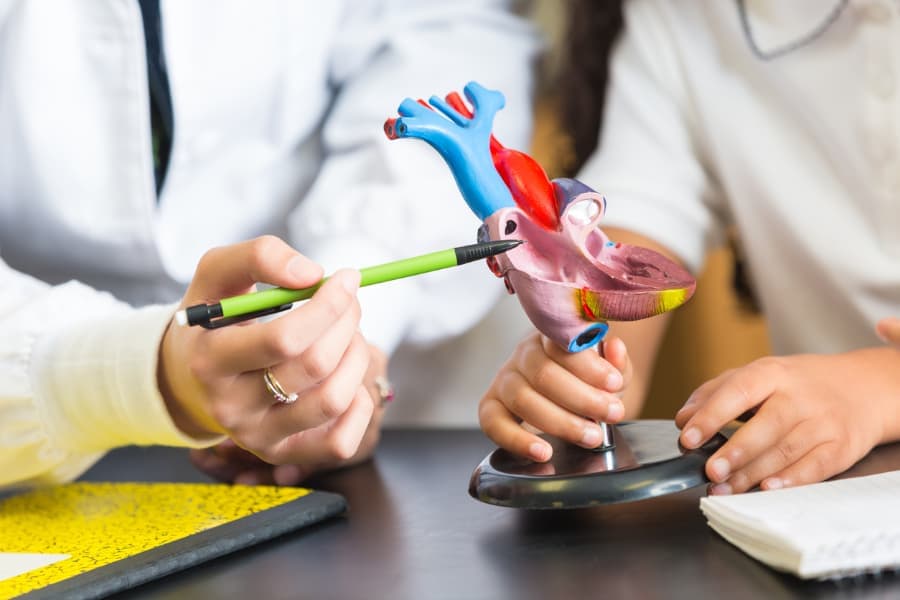The heart valves play a vital role in directing blood throughout the body. When one or more of them starts to fail, so does circulatory health. Heart valve repair and replacement are surgical procedures to restore the function of diseased or damaged valves. With the Cardiovascular Department at Richmond University Medical Center, learn more about these procedures, when they become necessary, and how physicians decide which is best.
What Is Heart Valve Disease?
The heart is a muscular pump responsible for cycling blood. It has four pumping chambers which provide the power necessary to maintain blood pressure throughout the body. Interconnecting them are four valves that allow blood to move between chambers. When valves are functioning properly, blood will continuously flow forward through the heart without backtracking. A few conditions, however, may impede the valve’s function:
- Stenosis: When valves become stenotic or stiff, the heart must work harder to push blood through the valve. Stenosis typically occurs as a result of infection or aging.
- Regurgitation: If a valve becomes leaky, blood may flow backward. This means less blood is moving in the correct direction, impacting the heart’s efficiency.
Both forms of valve disease have a significant impact on health. Patients with one or more affected valves may experience symptoms such as:
- Dizziness
- Fatigue
- Chest pain
- Difficulty breathing
- Heart palpitations
- Swelling in the belly, feet, or ankles
- Rapid weight gain
- Fainting
Surgery is often the best option to correct a damaged or diseased heart valve. Depending on the severity of symptoms and the heart’s overall condition, the valve may either be repaired or completely replaced.
Choosing Between Heart Valve Repair and Replacement
The recommended type of valve surgery depends on a variety of factors. When deciding on a procedure, cardiologists will consider:
- The heart’s structure and overall condition
- The location of the damaged or diseased valve
- The extent of damage or disease
- The origin and cause of heart valve disease
- The patient’s age and lifestyle
- Other medical conditions affecting the patient
Noninvasive cardiology testing will help cardiologists pinpoint which valve or valves are affected, in addition to the cause and severity of damage. This information, when evaluated alongside the patient’s medical history, will help them determine the best type of procedure.
How Is Valve Surgery Performed?
Heart valve repair and replacement surgeries are traditionally performed as open-heart surgery. This process involves making a large incision in the chest so that surgeons can access the heart directly.
Minimally invasive surgeries may also be possible thanks to recent innovations. These techniques utilize smaller incisions, potentially reducing the patient’s pain and recovery period.
Heart Valve Repair
Repair surgery aims to fix the faulty valve while preserving the original tissue. It typically involves inserting a ring to support the damaged valve. Repair is recommended whenever possible, as it carries a lower risk of infection and causes less stress for the heart. This results in a shorter recovery time, especially if performed in a minimally invasive manner.
Heart Valve Replacement
Replacement is performed when repair is no longer an option. During this procedure, the surgeon removes and replaces the entire valve structure. The new valve may be biological and made of tissue from donated valves. It may also be mechanical, made of metal, carbon, or plastic. Valve replacement is a more invasive procedure, and is usually chosen as a last resort.
Recovery and Follow-up
Heart surgery puts stress on the body. Afterward, patients can expect a stay at inpatient cardiology where physicians can closely monitor their health and prevent complications. The stay typically lasts five to seven days, after which patients may continue their recovery at home. Cardio rehabilitation may be recommended to slowly build up heart strength.
Heart valve repair does not typically require a follow-up. Because this procedure preserves the original tissue, the results last longer. The repaired valve may remain healthy and functional through the rest of the patient’s lifespan.
Valve replacement, however, is not indefinite. Biological replacements last 10 to 20 years. They do not require blood thinners, so they are typically recommended for older patients. Mechanical valves require the patient to take blood thinners, but can last up to 30 years. This makes them the preferred option for younger patients in hopes of avoiding a second replacement.
Find Treatment for Heart Disease at Richmond University Medical Center
Richmond University Medical Center is proud to support cardiovascular health for patients in Staten Island, New York. Cardiologists strive to educate patients on the available prevention and treatment options, helping all stay healthy. Patients also access surgical treatment, including heart valve repair and replacement. Contact us today to schedule an appointment.




